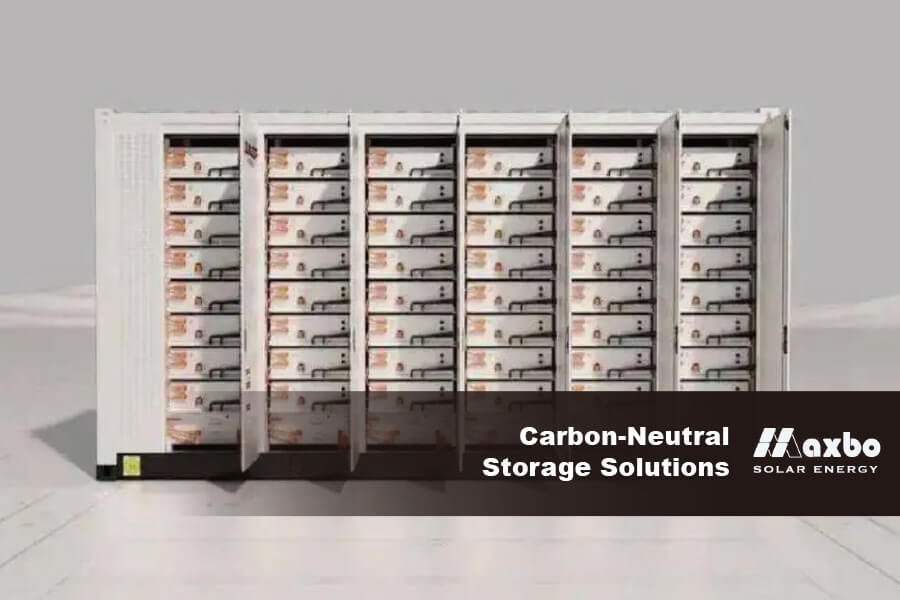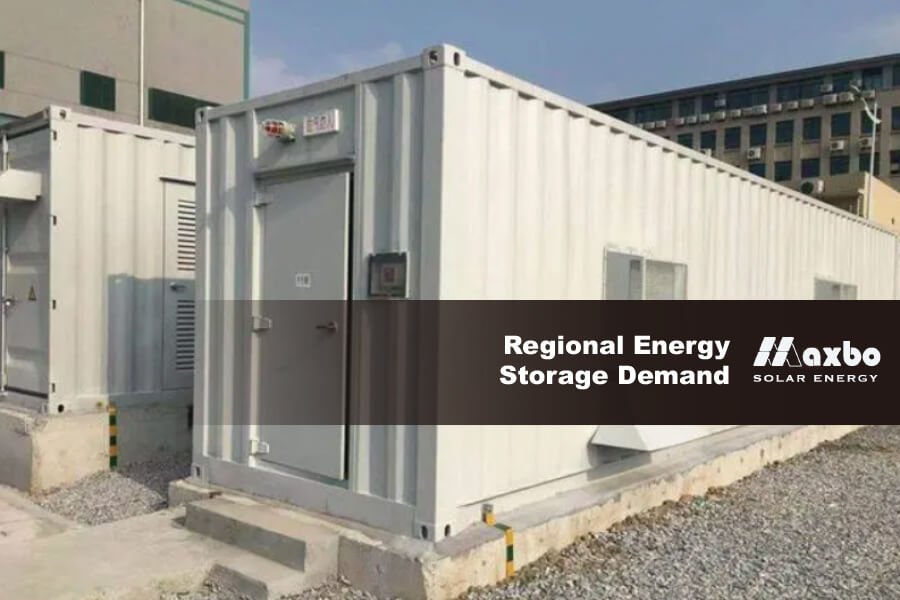At Maxbo, we specialize in providing top-notch solutions for energy storage systems tailored to commercial solar applications. In this extensive guide, we will delve into everything you need to know about energy storage systems for commercial solar. From understanding the benefits and key considerations to exploring costs and solutions, we’ve got you covered.
Table of Contents
ToggleUnderstanding Energy Storage Systems for Commercial Solar
What is an Energy Storage System for Commercial Solar?
An energy storage system for commercial solar is designed to capture and store excess solar energy produced by photovoltaic (PV) systems during peak sunlight hours. This stored energy can then be used during periods when solar production is low, such as at night or during cloudy weather. Implementing such a system in commercial solar setups can offer significant benefits in terms of energy management, cost savings, and operational efficiency.
Why Invest in Energy Storage Systems for Commercial Solar?
Investing in an energy storage system for commercial solar provides several advantages for businesses:
- Enhanced Energy Reliability: Ensure a consistent energy supply even during periods of low solar production or power outages.
- Cost Savings: Reduce energy costs by storing excess solar power and utilizing it during peak demand times when electricity prices are higher.
- Grid Independence: Decrease reliance on the grid and reduce exposure to fluctuating energy prices.
- Sustainability Goals: Meet corporate sustainability targets and reduce carbon footprint by maximizing the use of renewable energy.
Understanding these benefits underscores why an energy storage system for commercial solar is a smart investment for modern businesses.
Key Considerations for Energy Storage Systems for Commercial Solar
1. Battery Technologies
The choice of battery technology is crucial for the performance and cost of your energy storage system for commercial solar:
- Lithium-Ion Batteries: These batteries are known for their high efficiency, long lifespan, and compact size. They are ideal for commercial applications due to their performance and durability.
- Lead-Acid Batteries: Although less expensive, lead-acid batteries have a shorter lifespan and require more maintenance. They are generally used in smaller or less demanding installations.
- Flow Batteries: Suitable for larger installations, flow batteries offer long cycle life and high capacity but come at a higher cost and are less commonly used in commercial setups.
Selecting the right battery technology will significantly impact the effectiveness and cost of your energy storage system for commercial solar.
2. System Size and Capacity
The size and capacity of the energy storage system should align with your commercial energy needs:
- Small to Medium Systems: These are designed for businesses with moderate energy requirements and can provide sufficient storage for daily operations.
- Large Systems: For larger enterprises or those with higher energy demands, larger systems offer greater storage capacity and longer-lasting performance.
Determining the appropriate size for your energy storage system for commercial solar will help in optimizing your investment and ensuring adequate energy availability.
3. Installation and Integration
Proper installation and integration are essential for the success of your energy storage system for commercial solar:
- Installation Costs: The cost of installation varies depending on system complexity, battery type, and existing infrastructure. It is crucial to factor in these costs when planning your budget.
- Integration: Integrating the storage system with your existing solar infrastructure involves connecting batteries, inverters, and other components. A well-integrated system ensures smooth operation and maximum efficiency.
Considering these aspects ensures that your energy storage system for commercial solar operates effectively and meets your business needs.
4. Maintenance and Lifespan
Ongoing maintenance and the lifespan of your energy storage system are important for long-term cost management:
- Maintenance Requirements: Regular maintenance is needed to keep the system running optimally. This includes checking battery health, cleaning terminals, and ensuring proper ventilation.
- Battery Lifespan: The longevity of your battery system will affect the overall cost. Batteries with longer lifespans may have a higher initial cost but offer better long-term value.
Evaluating these factors helps in understanding the total cost of ownership for your energy storage system for commercial solar.
Cost Breakdown of Energy Storage Systems for Commercial Solar
1. Initial Costs
The initial costs are the most significant part of the energy storage system for commercial solar:
- Battery Costs: Prices vary based on battery type and capacity. Lithium-ion batteries generally range from $500 to $1,000 per kilowatt-hour (kWh), while lead-acid batteries are more affordable but less efficient.
- Inverter Costs: An inverter is necessary to convert stored energy into usable power. Inverter costs can range from $1,000 to $3,000, depending on the system’s capacity and features.
- Installation Costs: Installation expenses vary based on system size and complexity. Costs typically range between $1,000 and $5,000.
2. Ongoing Costs
Ongoing costs include maintenance and potential replacements:
- Maintenance: Regular upkeep is required to ensure optimal performance. This may involve periodic inspections, cleaning, and minor repairs.
- Repairs and Replacements: Components may need repair or replacement over time. Budgeting for these potential costs is crucial for long-term planning.
3. Energy Savings
The energy savings achieved with a storage system can offset some of the initial costs:
- Reduced Energy Bills: Storing excess solar energy for use during peak hours can lower your electricity bills.
- Government Incentives: Look for available incentives or rebates for installing energy storage systems, which can help reduce overall costs.
How to Choose the Right Energy Storage System for Commercial Solar
1. Assess Your Energy Needs
Evaluating your business’s energy consumption and storage requirements is the first step:
- Energy Consumption Patterns: Analyze your daily and seasonal energy usage to determine the appropriate system size and capacity.
- Peak Demand: Consider peak demand periods and how a storage system can help manage energy use during these times.
2. Compare Options
Evaluate different battery technologies and system providers to find the best fit:
- Battery Technologies: Compare the benefits and costs of lithium-ion, lead-acid, and flow batteries to choose the most suitable option.
- System Providers: Research various providers and get quotes to ensure you receive the best value for your investment.
3. Work with Experts
Partnering with experts ensures a smooth installation and optimal performance:
- Consult Maxbo: Our team at Maxbo offers expert consultations to help you select and implement the best energy storage system for commercial solar.
- Get Multiple Quotes: Obtain quotes from several providers to ensure competitive pricing and value.
Maxbo’s Solutions for Energy Storage Systems for Commercial Solar
At Maxbo, we offer a range of high-quality energy storage solutions tailored for commercial solar applications:
- Maxbo Lithium-Ion Batteries: These batteries are known for their efficiency, longevity, and compact design, making them ideal for commercial use.
- Maxbo Integrated Systems: Our integrated systems offer seamless performance and high reliability for various commercial solar setups.
- Maxbo Installation Services: Our expert installation services ensure that your energy storage system for commercial solar is set up for optimal performance.
For more information and to explore our products, visit Maxbo’s website.
Resources and References
For additional information on energy storage systems for commercial solar, consider the following authoritative resources:
- International Renewable Energy Agency (IRENA)
- U.S. Department of Energy – Energy Storage
- European Commission – Energy Storage
- National Renewable Energy Laboratory (NREL)
- Energy Storage Association
- Solar Energy Industries Association (SEIA)
- Renewable Energy World
- Clean Energy Review
- Energy Storage News
- Solar Power Europe
Conclusion
Investing in an energy storage system for commercial solar is a strategic decision that can greatly enhance your business’s energy efficiency and cost management. By understanding key factors such as battery technology, system size, installation costs, and maintenance, you can make an informed choice. At Maxbo, we are committed to providing high-quality products and expert guidance to optimize your commercial solar energy solution. Contact us today to discover how we can help you achieve your energy goals.
Related Solutions
Related Blogs
Offshore Wind BESS Container Europe: Slash Curtailment, Smooth Grids, and Boost Profits for Your Wind Farm
行政2025-12-19T14:09:10+08:00December 18th, 2025|Categories: Design, News|
Agri-PV BESS Container EU: Unlock 1.04GW EU Subsidy & Double Farm Profits by 2026
行政2025-12-19T14:12:15+08:00December 18th, 2025|Categories: Design, News|
Let’s Make Things Happen
Add notice about your Privacy Policy here.
Let’s Make Things Happen
”The Maxbo team of sales consultants will continue to enrich our own expertise and experience to empower the development of sustainable energy with rigor.“
Maxbo CEO
You will need to provide: 1. the amount of electricity used. 2. the type and power of the load. 3. the electricity consumption habits (daytime/nighttime consumption). 4. the need to store electricity. 5. the need to feed electricity to the mains. 6. drawings or address of the installation site. 7. other special requirements
We can provide you with a quotation, a specification for all products, a circuit connection diagram and a diagram of the installation and placement of the PV panels. Any other requirements and adjustments needed can be discussed with our team.
We can meet the needs of most scenarios, whether your application is for domestic, commercial and industrial use, in remote areas, or for grid-level energy storage, we have experienced colleagues to design and deliver the right solution.
Add notice about your Privacy Policy here.
How much solar power do I need?
Most homes need 5–12kW, depending on your energy use and location.
Off-grid vs. grid-tied — what’s the difference?
Off-grid works without the utility grid; grid-tied lets you sell extra power back.
Do I need permits?
Usually yes — check local rules or ask us for guidance.
How long does a battery last?
Depends on size and load. A 5kWh battery can power a fridge for about 40 hours.
Can I upgrade my system later?
Yes, our systems are modular and easy to expand.
Does Maxbo offer installation?
We ship globally and connect customers with trusted local installers.










